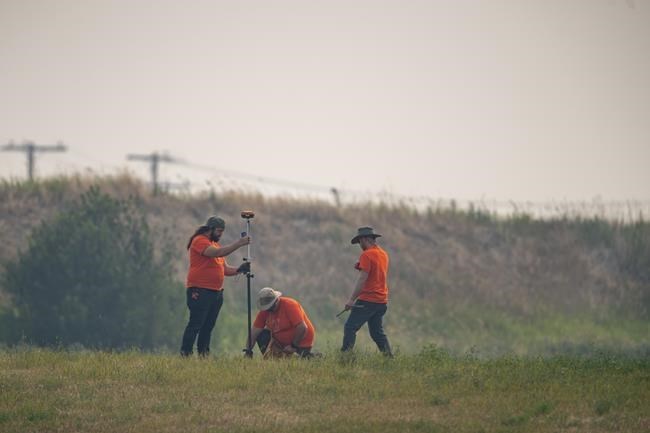DELMAS, SASKATCHEWAN — For elder Jenny Spyglass, returning to the site of a former residential school in Saskatchewan where a search for unmarked graves is underway brought back memories of what she lost.
Spyglass, now in her 70s, was taken to the Delmas/Thunderchild Indian Residential School, located 160 kilometres northwest of Saskatoon, when she was three years old.
Her brother died there of starvation at age four, she said.
"This is where they took my culture away," she said. "They took my language away from me. They took that love away from my mom. A two- or three-year-old girl would love to have their mom with them every day, every morning, feeding them, loving them. I didn't have that, growing up."
Spyglass joined other survivors, relatives and supporters on the former school grounds Saturday as the Battlefords Agency Tribal Chiefs (BATC) searched for unmarked graves at the site.
Spyglass said those overseeing the school cut her hair and threw her clothes away when she arrived as a child. She was punished if she spoke her language and was once locked up in a basement, hungry and crying, for hugging her brothers.
"I come from a poor family, but there was love in there. When I came here, there was no love. When I came here, there was punishment for being who I am."
The Delmas/Thunderchild school was operated by the Roman Catholic Church from 1901 to 1948, when it burned down.
The Truth and Reconciliation Commission report found the school was overcrowded and many students became sick or died of typhoid, tuberculosis, jaundice, pneumonia and other illnesses.
An estimated 150,000 First Nations, Inuit and Metis children attended residential schools between the 1860s and 1996.
The commission documented stories from survivors and families and issued a report in 2015 that detailed mistreatment, including emotional, physical and sexual abuse. It said there were at least 4,100 deaths across Canada.
While engineers from SNC-Lavalin began their ground-penetrating radar search Saturday, elder Mary Bernadette Fineday shared stories about her family's experience at Delmas. Both her parents went to the school, she said.
"My mom used to tell me – I would ask 'what's wrong' and she would say 'we were treated badly,' " Fineday said.
Fineday was born in 1942 and said the school burned down in 1948. She never attended the residential school herself, but the students left a lasting impression on her.
"I remember I used to see girls," she said. "They used to walk two by two, with short hair – very short – navy blue skirts or black skirts, white blouses, white socks. They used to go two by two, and I used to wonder where they were going."
In June, the BATC announced their plan to begin to search this site for unmarked graves. The search is expected to continue intermittently until the ground freezes.
Karen Whitecalf, board secretary for the BATC and project lead for the residential school ground searches at Delmas and in the Battlefords, said oral history accounts have described a graveyard by the site of the former school.
That land is now privately owned, but Whitecalf said the BATC has formed a strong relationship with Donna and Doug McBain, who purchased the property two years ago.
"We are just grateful they have given us this opportunity to search their land for our children," Karen Whitecalf said.
Doug McBain said he and Donna did not know about the potential gravesite when they purchased the property, but soon started hearing rumours.
"It was scary," he said. "Living in a graveyard is not anybody's cup of tea, I'm sure."
If bodies are found on the McBains' property, Doug McBain said they will act as "keepers of the land" and would only ever sell it to First Nations people.
Whitecalf hopes inviting the public to attend the first days of this search will help support learning, understanding and healing.
"Our people knew that our children lay on these grounds, we always knew it," she said. "But it was kept a secret. And what I feel is that we shouldn't keep secrets anymore."
Laurie Whitecalf, Chief of Sweetgrass First Nation, also believes it is important to share this search openly.
"It's a secret that Canada wanted to keep buried," she said.
Laurie Whitecalf's uncle also attended the residential school, and he told her the story of when his parents brought his sister to visit.
"My uncle was telling me last week, 'when I saw her pulling up, I started praying: don't come here, go away'," she said. "He likened it to a jail for kids."
Going forward, Karen Whitecalf said she hopes identifying the graves can be a healing experience for Indigenous communities whose children were taken to Delmas, as well as for the Town of Delmas.
"What I would love to see is maybe the First Nations and the community of Delmas come together and build a healing park or a healing garden (at this site), somewhere we could all get together," she said.
This report by The Canadian Press was first published July 17, 2021.
Julia Peterson, The Canadian Press



